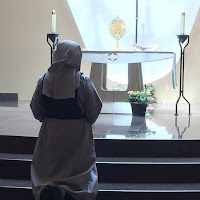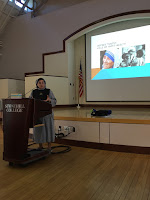| ||
|
6.24.2016
Joy and Strength in Suffering
6.17.2016
Reflection: Take Courage and Be Not Afraid
Sr. Natalie Sayde Salameh
Over the weekend of July 10 – July 12, Sr. Therese Maria and
I attended the Portsmouth Institute Conference on Christian Courage in a
Secular Age. The Conference was held at the Benedictine Portsmouth Abbey in
Rhode Island, and featured a number of well-known Catholic speakers such as
Brandon McGinley from EWTN publishing; Sr. Constance Veit from the Little
Sisters of the Poor; Robert P. George from Princeton University; and Mother
Olga Yaqoob, Foundress of the Daughters of Mary of Nazareth.
A recurring theme throughout the Conference was how do we,
as Catholics, stand up and defend our Christian values and beliefs in this
current secular age, an age that is increasingly relegating God to the
sidelines, if not trying to obliterate His presence altogether from the public
sphere. Let’s face it, as Christians, we are living in a tough world, a world
that is constantly telling us that there are no truths to uphold, there are no
moral absolutes, so why bother? Well, you and I know differently. Because as
soon as we start espousing the views of the world, and telling ourselves that
there really are no moral values to uphold or live by, then morally
reprehensible things like abortion and euthanasia become ‘ok’. But you and I
know that they are far from ‘ok’.
The whole line up of speakers over the weekend constantly
touched upon and/or alluded to this recurring theme. I want to share with you
one or two points from three of the speakers in the hopes that it might
embolden you to stand up and speak out in defense of our faith when called upon
or challenged to do so by the demands of our secular world.
Brandon McGinley spoke at length at how our secular culture
is increasingly encouraging ‘freedom’ and ‘personal autonomy’, at the expense
of procreation and fertility. Having a baby is becoming ‘ok’ in our society if
it expresses the parents’ autonomy, that is, it is ‘planned’ (the term should
be used loosely because we can plan nothing). The underlying current in all
this is that people in society today like to feel in control and procreation
becomes just one more thing that (they think) they can control. The use of
contraceptive devices becomes a key tool in this web of attempting to control
when life is produced or not produced. So what’s the remedy to this unhealthiness
where God is clearly absent? Brandon calls it the “courage of fecundity”, that
is, acknowledging that we are not in control, and relying on God’s grace to get
us through any difficulties or trials we may experience, which may be the
unexpected arrival of a little bundle of joy. The remedy is to be open to life!
 Robert P. George of Princeton University asked the $64
million question – “are we ashamed of the gospel?” The gospel is not just the
writings of the four evangelists and the epistles of St. Paul, its not just the
New Testament as Robert P. George points out. The gospel is also believing in
the Church’s teachings on the dignity of the human person, the sanctity of life
and sexual morality. Are we ashamed of the
gospel, in its entirety because we live in a culture which attempts to deny,
suppress and silence us on these very issues? Food for thought….
Robert P. George of Princeton University asked the $64
million question – “are we ashamed of the gospel?” The gospel is not just the
writings of the four evangelists and the epistles of St. Paul, its not just the
New Testament as Robert P. George points out. The gospel is also believing in
the Church’s teachings on the dignity of the human person, the sanctity of life
and sexual morality. Are we ashamed of the
gospel, in its entirety because we live in a culture which attempts to deny,
suppress and silence us on these very issues? Food for thought….6.10.2016
The Foundation of Humility
Homily of
Fr. Herbert Nicholls
In the Gospel today
(cf. Mt 18: 1 – 5), Jesus begins a series of instruction on the way in which
His Church is to be administered. The first five verses of Chapter 18 are
addressed to leaders, that is, the future hierarchy of the Church. It warns
against natural tendencies to pride and ambition. In whatever position they
must act with humility.
St. Augustine tells us
that humility is one of the main pillars of Christian life. If you ask me, he said, what is the essential thing in the religion
and discipline of Jesus Christ, I shall reply:
first, humility; second, humility; and third, humility.
Fr. Luis de Granada
makes the point that humility is superior to virginity. If you cannot imitate the virginity of the humble then at least imitate
the humility of the virgin. Virginity is praiseworthy but humility is
necessary. Virginity is recommended but humility is obligatory. We are invited
to virginity; but to humility we are compelled. Virginity is a voluntary
sacrifice but humility requires an obligatory sacrifice. Lastly, you can be
saved without virginity but you cannot be saved without humility.
 Let us now take a
glimpse at our Saint of the day (June 6). Dorotheus was a priest of the Diocese of Tyre.
During the reign of Diocletian, he suffered much persecution in his home
Diocese, eventually he was driven into exile at Odyssopolis. The lull in
persecution under the Emperor Constantine enabled him to return to Tyre where
he was elected bishop.
Let us now take a
glimpse at our Saint of the day (June 6). Dorotheus was a priest of the Diocese of Tyre.
During the reign of Diocletian, he suffered much persecution in his home
Diocese, eventually he was driven into exile at Odyssopolis. The lull in
persecution under the Emperor Constantine enabled him to return to Tyre where
he was elected bishop.
Dorotheus was a man of
great learning, well versed in both Latin and Greek, and he is reported to have
authored several books. He was a full participant at the Council of Nicaea in
325. Unfortunately Constantine was succeeded by the Emperor Julian who brought
back a renewal of persecutions.
He was again exiled to
Odyssopolis which today is the port of the city of Varna in Bulgaria. Even so
he was not left in peace but so cruelly beaten, that he died of his injuries at
the age of 107 in the year 362.
"Called to be ‘Mercy’” – Teen Retreat, Easton, MA.
Sr. Natalie Sayde
The Maronite Servants
of Christ the Light presented a retreat reflection on May 31st (Feast
of the Visitation) to the eighth grade students graduating from Trinity
Catholic Academy, Brockton. The retreat, held at Stonehill College, was hosted
and facilitated by Fr. Carlos Suarez, vocation director in the Archdiocese of
Boston, with the focus on their transitioning to high school.
 The retreat began with
Divine Liturgy celebrated in the Chapel of Our Lady of Sorrows. Fr. Carlos set
the tone of the day by reminding the students that they are called to be like
our Lady in her visitation to Elizabeth, in that, they are called to come out
of themselves and serve the other in their moments of need and difficulty.
Let’s face it – its hard to consider the other when we are so absorbed by
what’s troubling us, but Mary gives us a beautiful example. Rather than being
troubled by so many variables such as, how am I going to make this long
journey? What if something happens to my baby along the way? How am I going to
explain my pregnancy to Elizabeth? Mary sets out with love, only to find love
awaiting her.
The retreat began with
Divine Liturgy celebrated in the Chapel of Our Lady of Sorrows. Fr. Carlos set
the tone of the day by reminding the students that they are called to be like
our Lady in her visitation to Elizabeth, in that, they are called to come out
of themselves and serve the other in their moments of need and difficulty.
Let’s face it – its hard to consider the other when we are so absorbed by
what’s troubling us, but Mary gives us a beautiful example. Rather than being
troubled by so many variables such as, how am I going to make this long
journey? What if something happens to my baby along the way? How am I going to
explain my pregnancy to Elizabeth? Mary sets out with love, only to find love
awaiting her.
After, some fun icebreakers
and group activities, Mother Marla Marie presented a retreat reflection on
being “mercy”. Specifically, Mother Marla Marie explained how we are called
everyday, not just in this Jubilee Year of Mercy, to be merciful to others. Jesus
gave us the corporal and spiritual works of mercy, so that none of us can be in
any doubt what Our Lord meant when He said, “Be merciful as your Heavenly Father is merciful” (Lk 6: 36).
6.03.2016
Studying at our Seminary - Washington D.C.
 The Maronite Servants of Christ the Light were in Washington
D.C. from Wednesday, May 25th to Sunday May 29th for
music classes at our Maronite Seminary with
The Maronite Servants of Christ the Light were in Washington
D.C. from Wednesday, May 25th to Sunday May 29th for
music classes at our Maronite Seminary with
The Maronite Divine Praises (the Maronite Liturgy of the Hours) is currently under review in
Lebanon. At present, several of hymns, psalm tones and chants have been completed and translated into English. We are still awaiting
the final version of the full text. As Maronite Servant Sisters, we pray the Maronite Divine
Praises three times a day (morning, evening and night).
Fr. Geoffrey taught us several of the new hymns,
tones, chants and melodies to be sung during Morning and Evening Prayer across
the Maronite Liturgical seasons.
 On Sunday, May 29th, following Divine Liturgy at
Our Lady of Lebanon, the Sisters participated in a Holy Hour with the parish
for vocations to priestly and religious life. It was a great blessing to pray
with our parishioners, who so often pray for us.
On Sunday, May 29th, following Divine Liturgy at
Our Lady of Lebanon, the Sisters participated in a Holy Hour with the parish
for vocations to priestly and religious life. It was a great blessing to pray
with our parishioners, who so often pray for us.
Subscribe to:
Comments (Atom)




